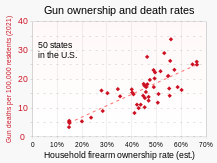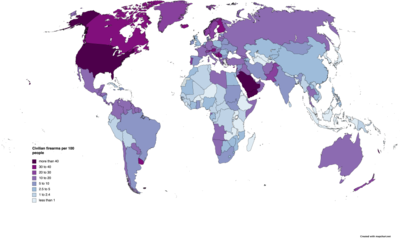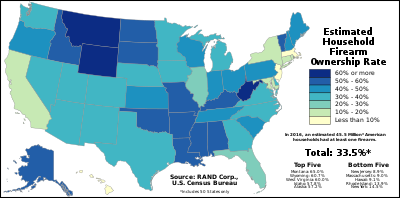Gun ownership
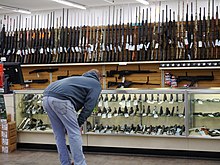

In 2018, the Small Arms Survey reported that there are over one billion small arms distributed globally, of which 857 million (about 85 percent) are in civilian hands.[1][2] The survey stated that USA civilians account for an estimated 393 million (about 46 percent) of the worldwide total of civilian held firearms,[2] or about 120.5 firearms for every 100 American residents.[2]
From 1994 to 2023, gun ownership increased 28% in America. In 2023, about 16.7 million firearms were sold in the U.S. In the first four months of 2024, nearly 5.5 million firearms were sold, averaging around 1.3 million per month. About 72% of gun owners say they own a gun primarily for protection.[3]
The world's armed forces control about 133 million (approximately 13 percent) of the global total of small arms, of which over 43 percent belong to two countries: Russia (30.3 million) and China (27.5 million).[1] Law enforcement agencies control about 23 million (about 2 percent) of the global total of small arms.[1] Gun ownership is a protected right in countries such as the United States and Yemen.[4]
Global distribution of civilian-held firearms
[edit]The following data comes from the Small Arms Survey. For more tables see: Estimated number of civilian guns per capita by country and Percent of households with guns by country.
| Countries and territories | Estimate of firearms in civilian possession | Population 2017 | Estimate of civilian firearms per 100 people |
|---|---|---|---|
| 4,270,000 | 34,169,000 | 12.5 | |
| 350,000 | 2,911,000 | 12.0 | |
| 877,000 | 41,064,000 | 2.1 | |
| 400 | 56,000 | 0.7 | |
| 10,000 | 69,000 | 14.1 | |
| 2,982,000 | 26,656,000 | 11.2 | |
| 5,000 | 94,000 | 5.4 | |
| 3,256,000 | 44,272,000 | 7.4 | |
| 186,000 | 3,032,000 | 6.1 | |
| 3,000 | 105,000 | 2.6 | |
| 3,573,000 | 24,642,000 | 14.5 | |
| 2,577,000 | 8,592,000 | 30.0 | |
| 362,000 | 9,974,000 | 3.6 | |
| 74,000 | 397,000 | 18.8 | |
| 181,000 | 1,419,000 | 12.8 | |
| 659,000 | 164,828,000 | 0.4 | |
| 10,000 | 286,000 | 3.5 | |
| 581,000 | 9,459,000 | 6.1 | |
| 1,451,000 | 11,444,000 | 12.7 | |
| 37,000 | 375,000 | 10.0 | |
| 33,000 | 11,459,000 | 0.3 | |
| 3,000 | 61,000 | 4.6 | |
| 6,000 | 793,000 | 0.8 | |
| 218,000 | 11,053,000 | 2.0 | |
| 1,185,000 | 3,793,000 | 31.2 | |
| 97,000 | 2,344,000 | 4.1 | |
| 17,510,000 | 211,243,000 | 8.3 | |
| 6,000 | 434,000 | 1.4 | |
| 590,000 | 7,045,000 | 8.4 | |
| 175,000 | 19,173,000 | 0.9 | |
| 238,000 | 11,936,000 | 2.0 | |
| 717,000 | 16,076,000 | 4.5 | |
| 510,000 | 24,514,000 | 2.1 | |
| 12,708,000 | 36,626,000 | 34.7 | |
| 31,000 | 533,000 | 5.7 | |
| 6,000 | 62,000 | 9.2 | |
| 94,000 | 5,099,000 | 1.8 | |
| 151,000 | 14,965,000 | 1.0 | |
| 23,000 | 165,000 | 14.0 | |
| 2,220,000 | 18,313,000 | 12.1 | |
| 49,735,000 | 1,388,233,000 | 3.6 | |
| 0 | 2,000 | 0.0 | |
| 4,971,000 | 49,068,000 | 10.1 | |
| 12,000 | 826,000 | 1.5 | |
| 493,000 | 4,906,000 | 10.0 | |
| 576,000 | 4,210,000 | 13.7 | |
| 234,000 | 11,390,000 | 2.1 | |
| 4,000 | 160,000 | 2.6 | |
| 285,000 | 839,000 | 34.0 | |
| 1,323,000 | 10,555,000 | 12.5 | |
| 946,000 | 82,243,000 | 1.2 | |
| 567,000 | 5,712,000 | 9.9 | |
| 28,000 | 911,000 | 3.1 | |
| 5,000 | 73,000 | 6.2 | |
| 795,000 | 10,767,000 | 7.4 | |
| 402,000 | 16,626,000 | 2.4 | |
| 3,931,000 | 95,215,000 | 4.1 | |
| 737,000 | 6,167,000 | 12.0 | |
| 2,731,000 | 58,877,000 | 4.6 | |
| 112,000 | 894,000 | 12.5 | |
| 23,000 | 5,482,000 | 0.4 | |
| 65,000 | 1,306,000 | 5.0 | |
| 377,000 | 104,345,000 | 0.4 | |
| 2,000 | 3,000 | 66.7 | |
| 5,000 | 49,000 | 9.9 | |
| 5,000 | 903,000 | 0.5 | |
| 1,793,000 | 5,541,000 | 32.4 | |
| 12,732,000 | 64,939,000 | 19.6 | |
| 55,000 | 283,000 | 19.6 | |
| 7,000 | 289,000 | 2.5 | |
| 61,000 | 1,801,000 | 3.4 | |
| 137,000 | 2,120,000 | 6.5 | |
| 402,000 | 3,973,000 | 10.1 | |
| 15,822,000 | 80,636,000 | 19.6 | |
| 2,280,000 | 28,657,000 | 8.0 | |
| 1,000 | 32,000 | 4.1 | |
| 1,920,000 | 10,893,000 | 17.6 | |
| 13,000 | 56,000 | 22.3 | |
| 5,000 | 108,000 | 4.6 | |
| 40,000 | 472,000 | 8.5 | |
| 20,000 | 174,000 | 11.5 | |
| 2,062,000 | 17,005,000 | 12.1 | |
| 130,000 | 13,291,000 | 1.0 | |
| 29,000 | 1,933,000 | 1.5 | |
| 122,000 | 774,000 | 15.8 | |
| 291,000 | 10,983,000 | 2.6 | |
| 0 | 1,000 | 0.0 | |
| 1,171,000 | 8,305,000 | 14.1 | |
| 265,000 | 7,402,000 | 3.6 | |
| 1,023,000 | 9,788,000 | 10.5 | |
| 106,000 | 334,000 | 31.7 | |
| 71,101,000 | 1,342,513,000 | 5.3 | |
| 82,000 | 263,510,000 | 0.03 | |
| 5,890,000 | 80,946,000 | 7.3 | |
| 7,588,000 | 38,654,000 | 19.6 | |
| 342,000 | 4,749,000 | 7.2 | |
| 557,000 | 8,323,000 | 6.7 | |
| 8,609,000 | 59,798,000 | 14.4 | |
| 1,049,000 | 23,816,000 | 4.4 | |
| 246,000 | 2,813,000 | 8.8 | |
| 377,000 | 126,045,000 | 0.3 | |
| 1,473,000 | 7,877,000 | 18.7 | |
| 504,000 | 18,064,000 | 2.8 | |
| 750,000 | 48,467,000 | 1.5 | |
| 900 | 116,000 | 0.8 | |
| 436,000 | 1,831,000 | 23.8 | |
| 685,000 | 4,100,000 | 16.7 | |
| 171,000 | 6,125,000 | 2.8 | |
| 215,000 | 7,038,000 | 3.0 | |
| 205,000 | 1,945,000 | 10.5 | |
| 1,927,000 | 6,039,000 | 31.9 | |
| 105,000 | 2,185,000 | 4.8 | |
| 97,000 | 4,730,000 | 2.1 | |
| 851,000 | 6,409,000 | 13.3 | |
| 11,000 | 38,000 | 28.8 | |
| 385,000 | 2,831,000 | 13.6 | |
| 110,000 | 584,000 | 18.9 | |
| 22,000 | 606,000 | 3.6 | |
| 168,000 | 25,613,000 | 0.7 | |
| 47,000 | 18,299,000 | 0.3 | |
| 217,000 | 31,164,000 | 0.7 | |
| 23,000 | 376,000 | 6.2 | |
| 206,000 | 18,690,000 | 1.1 | |
| 119,000 | 421,000 | 28.3 | |
| 300 | 53,000 | 0.5 | |
| 34,000 | 396,000 | 8.5 | |
| 120,000 | 4,266,000 | 2.8 | |
| 106,000 | 1,281,000 | 8.3 | |
| 16,809,000 | 130,223,000 | 12.9 | |
| 700 | 106,000 | 0.7 | |
| 121,000 | 4,055,000 | 3.0 | |
| 7,000 | 38,000 | 18.4 | |
| 242,000 | 3,052,000 | 7.9 | |
| 245,000 | 626,000 | 39.1 | |
| 300 | 5,000 | 5.4 | |
| 1,690,000 | 35,241,000 | 4.8 | |
| 1,337,000 | 29,538,000 | 4.5 | |
| 877,000 | 54,836,000 | 1.6 | |
| 396,000 | 2,569,000 | 15.4 | |
| 0 | 10,000 | 0.0 | |
| 444,000 | 29,187,000 | 1.5 | |
| 442,000 | 17,033,000 | 2.6 | |
| 115,000 | 270,000 | 42.5 | |
| 1,212,000 | 4,605,000 | 26.3 | |
| 323,000 | 6,218,000 | 5.2 | |
| 117,000 | 21,564,000 | 0.5 | |
| 6,154,000 | 191,836,000 | 3.2 | |
| 206,000 | 1,873,000 | 11.0 | |
| 1,000 | 56,000 | 2.6 | |
| 76,000 | 25,405,000 | 0.3 | |
| 1,537,000 | 5,331,000 | 28.8 | |
| 792,000 | 4,741,000 | 16.7 | |
| 43,917,000 | 196,744,000 | 22.3 | |
| 100 | 22,000 | 0.5 | |
| 56,000 | 4,952,000 | 1.1 | |
| 436,000 | 4,051,000 | 10.8 | |
| 79,000 | 7,934,000 | 1.0 | |
| 1,140,000 | 6,812,000 | 16.7 | |
| 633,000 | 32,166,000 | 2.0 | |
| 3,776,000 | 103,797,000 | 3.6 | |
| 968,000 | 38,564,000 | 2.5 | |
| 2,186,000 | 10,265,000 | 21.3 | |
| 422,000 | 3,679,000 | 11.5 | |
| 246,000 | 1,995,000 | 12.3 | |
| 390,000 | 2,338,000 | 16.7 | |
| 119,000 | 4,866,000 | 2.4 | |
| 171,000 | 873,000 | 19.6 | |
| 506,000 | 19,238,000 | 2.6 | |
| 17,620,000 | 143,375,000 | 12.3 | |
| 66,000 | 12,160,000 | 0.5 | |
| 2,000 | 57,000 | 3.4 | |
| 6,000 | 188,000 | 3.4 | |
| 3,000 | 32,000 | 8.5 | |
| 4,000 | 110,000 | 3.4 | |
| 20,000 | 196,000 | 10.1 | |
| 5,000 | 32,000 | 15.6 | |
| 7,000 | 198,000 | 3.4 | |
| 12,564,000 | 32,743,000 | 53.7 | |
| 305,000 | 5,436,000 | 5.6 | |
| 323,000 | 16,054,000 | 2.0 | |
| 2,719,000 | 6,946,000 | 39.1 | |
| 4,000 | 98,000 | 4.1 | |
| 35,000 | 6,733,000 | 0.5 | |
| 20,000 | 5,785,000 | 0.3 | |
| 2,000 | 40,000 | 4.2 | |
| 355,000 | 5,432,000 | 6.5 | |
| 324,000 | 2,071,000 | 15.6 | |
| 1,000 | 606,000 | 0.2 | |
| 1,145,000 | 9,225,000 | 12.4 | |
| 456,000 | 3,823,000 | 11.9 | |
| 5,351,000 | 55,436,000 | 9.7 | |
| 79,000 | 50,705,000 | 0.2 | |
| 1,255,000 | 13,096,000 | 9.6 | |
| 3,464,000 | 46,070,000 | 7.5 | |
| 494,000 | 20,905,000 | 2.4 | |
| 2,768,000 | 42,166,000 | 6.6 | |
| 88,000 | 552,000 | 15.9 | |
| 64,000 | 1,320,000 | 4.8 | |
| 2,296,000 | 9,921,000 | 23.1 | |
| 2,332,000 | 8,454,000 | 27.6 | |
| 1,547,000 | 18,907,000 | 8.2 | |
| 10,000 | 23,405,000 | 0.04 | |
| 37,000 | 8,858,000 | 0.4 | |
| 427,000 | 56,878,000 | 0.8 | |
| 10,342,000 | 68,298,000 | 15.1 | |
| 3,000 | 1,237,000 | 0.3 | |
| 58,000 | 7,692,000 | 0.8 | |
| 9,000 | 108,000 | 8.0 | |
| 43,000 | 1,369,000 | 3.2 | |
| 123,000 | 11,495,000 | 1.1 | |
| 13,249,000 | 80,418,000 | 16.5 | |
| 23,000 | 5,503,000 | 0.4 | |
| 1,000 | 35,000 | 3.3 | |
| 100 | 10,000 | 1.2 | |
| 331,000 | 41,653,000 | 0.8 | |
| 4,396,000 | 44,405,000 | 9.9 | |
| 1,569,000 | 9,398,000 | 16.7 | |
| 393,347,000 | 326,474,000 | 120.5 | |
| 1,198,000 | 3,457,000 | 34.7 | |
| 127,000 | 30,691,000 | 0.4 | |
| 11,000 | 276,000 | 3.9 | |
| 5,895,000 | 31,926,000 | 18.5 | |
| 1,562,000 | 95,415,000 | 1.6 | |
| 300 | 31,000 | 0.8 | |
| 18,000 | 107,000 | 16.6 | |
| 14,859,000 | 28,120,000 | 52.8 | |
| 158,000 | 17,238,000 | 0.9 | |
| 455,000 | 16,338,000 | 2.8 |
Association with rates of violence in times of peace
[edit]Some studies suggest that higher rates of gun ownership are associated with higher homicide rates,[11][12][13] although Gary Kleck argues that the highest-quality studies show that gun ownership does not increase homicide rates.[14] Higher rates of gun ownership are also associated with higher suicide rates[15][16] and higher accidental gun death rates.[17][18][19] The availability of illegal guns, but not that of legal guns, is associated with higher rates of violent crime.[20]
An international study by UNICRI researchers from 2001 examined the link between household gun ownership and overall homicide, overall suicide, as well as gun homicide and gun suicide rates amongst 21 countries. Significant correlations between household gun ownership and rates of gun suicides for both genders, and gun homicide rates involving female victims were found. There were no significant correlations detected for total homicide and suicide rates, as well as gun homicide rates involving male victims.[21] This study has been criticized for combining high-income countries (like the United States) with middle-income countries (like Estonia); if middle-income countries are excluded from the analysis, a strong relationship emerges between gun ownership and homicide.[22] However the Hemenway study has been criticized in response as well. When removing the United States as an outlier and using the superior proxy of gun ownership in the study (percentage of firearm suicides over all suicides), the relationship ceases to be significant. The association between gun ownership and homicide rates across nations is dependent on the inclusion of the U.S.[23] Studies in Canada that examined the levels of gun ownership by province have found no correlations with provincial overall suicide rates.[24] A 2011 study conducted looking at the effects of gun control legislation passed in Canada and the associated effects in homicide rates found no significant reductions in homicide rates as a result of legislation.[25] A case-control study conducted in New Zealand looking at household gun ownership and the risk of suicides found no significant associations.[26]
Maps
[edit]Gallery
[edit]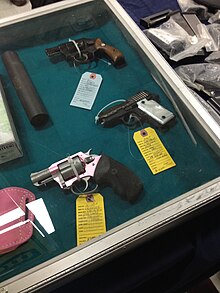

See also
[edit]- Gun control
- Gun violence
- Gun culture in the United States
- Right to keep and bear arms in the United States
- Gun politics in the United States
- Index of gun politics articles
- Gun violence in the United States by state
- Percent of households with guns by country
- Number of guns per capita by country
References
[edit]- ^ a b c smallarmssurvey.org Small Arms Survey reveals: More than one billion firearms in the world
- ^ a b c smallarmssurvey.org Estimating Global CivilianHELD Firearms Numbers. Aaron Karp. June 2018
- ^ "How Many Gun Owners Are In America? 2023 - 2024 Statistics".
- ^ Haroun, Brennan Weiss, James Pasley, Azmi. "Only 3 countries in the world protect the right to bear arms in their constitutions: the US, Mexico, and Guatemala". Business Insider. Retrieved 2023-04-24.
{{cite web}}: CS1 maint: multiple names: authors list (link) - ^ smallarmssurvey.org June 2018, Estimating Global Civilian Held Firearms Numbers by Aaron Karp
- ^ Civilian Firearms Holdings, 2017. smallarmssurvey.org. Archived on 29 June 2018.
- ^ Fox, Kara; Shveda, Krystina; Croker, Natalie; Chacon, Marco (November 26, 2021). "How US gun culture stacks up with the world". CNN. Archived from the original on November 26, 2021.
CNN's attribution: Developed countries are defined based on the UN classification, which includes 36 countries. Source: Institute for Health Metrics and Evaluation (Global Burden of Disease 2019), Small Arms Survey (Civilian Firearm Holdings 2017)
- ^ Mortality data from "Firearm Mortality by State". cdc.gov. Center for Disease Control and Prevention, National Center for Health Statistics. 2022. Archived from the original on June 3, 2023.
The number of deaths per 100,000 total population. Source: wonder.cdc.gov
● Household firearm ownership data from Schell, Terry L.; Peterson, Samuel; Vegetabile, Brian G.; Scherling, Adam; Smart, Rosanna; Morral, Andrew R. (April 22, 2020). "State-Level Estimates of Household Firearm Ownership". rand.org. RAND Corporation. p. 21. Archived from the original on May 5, 2023. Fig. 2. PDF file (download link) - ^ ● Gun sale data from Brownlee, Chip (December 31, 2023). "Gun Violence by the Numbers in 2023". The Trace. Archived from the original on January 28, 2024.
● NICS firearm check data downloaded via link at "NICS Firearm Background Checks: Month/Year" (PDF). FBI.gov. Federal Bureau of Investigation. January 2024. Archived (PDF) from the original on January 29, 2024. - ^ a b Mascia, Jennifer; Brownlee, Chip (April 9, 2024). "The Armed Era". The Trace. Archived from the original on April 14, 2024.
- ^ Miller, Matthew; Azrael, Deborah; Hemenway, David (December 2002). "Rates of Household Firearm Ownership and Homicide Across US Regions and States, 1988–1997". American Journal of Public Health. 92 (12): 1988–1993. doi:10.2105/AJPH.92.12.1988. PMC 1447364. PMID 12453821.
- ^ Hoskin, Anthony W. (September 2001). "Armed Americans: The impact of firearm availability on national homicide rates". Justice Quarterly. 18 (3): 569–592. doi:10.1080/07418820100095021. S2CID 143203446.
- ^ Miller, Matthew; Hemenway, David; Azrael, Deborah (February 2007). "State-level homicide victimization rates in the US in relation to survey measures of household firearm ownership, 2001–2003". Social Science & Medicine. 64 (3): 656–664. doi:10.1016/j.socscimed.2006.09.024. PMID 17070975.
- ^ Kleck, Gary (January 2015). "The Impact of Gun Ownership Rates on Crime Rates: A Methodological Review of the Evidence". Journal of Criminal Justice. 43 (1): 40–48. doi:10.1016/j.jcrimjus.2014.12.002.
- ^ Anestis, MD; Houtsma, C (13 March 2017). "The Association Between Gun Ownership and Statewide Overall Suicide Rates". Suicide and Life-Threatening Behavior. 48 (2): 204–217. doi:10.1111/sltb.12346. PMID 28294383. S2CID 4756779.
- ^ Westefeld, John S.; Gann, Lianne C.; Lustgarten, Samuel D.; Yeates, Kevin J. (2016). "Relationships between firearm availability and suicide: The role of psychology". Professional Psychology: Research and Practice. 47 (4): 271–277. doi:10.1037/pro0000089.
- ^ Miller, M; Azrael, D; Hemenway, D (February 2002). "Firearm availability and unintentional firearm deaths, suicide, and homicide among 5-14 year olds". The Journal of Trauma. 52 (2): 267–74, discussion 274–5. doi:10.1097/00005373-200202000-00011. PMID 11834986.
- ^ Miller, M. (1 March 2002). "Firearm Availability and Suicide, Homicide, and Unintentional Firearm Deaths Among Women". Journal of Urban Health. 79 (1): 26–38. doi:10.1093/jurban/79.1.26. PMC 3456383. PMID 11937613.
- ^ Miller, Mathew; Azrael, Deborah; Hemenway, David (July 2001). "Firearm availability and unintentional firearm deaths". Accident Analysis & Prevention. 33 (4): 477–484. doi:10.1016/S0001-4575(00)00061-0. PMID 11426678.
- ^ Stolzenberg, L.; D'Alessio, S. J. (1 June 2000). "Gun Availability and Violent Crime: New Evidence from the National Incident-Based Reporting System". Social Forces. 78 (4): 1461–1482. doi:10.1093/sf/78.4.1461.
- ^ https://pure.uvt.nl/ws/portalfiles/portal/5263789/GunsKilliasvKesteren.pdf [bare URL PDF]
- ^ Hemenway, David (June 2009). "Don B. Kates and Gary Mauser. "Would Banning Firearms Reduce Murder and Suicide? A Review of International and Some Domestic Evidence" Harvard Journal of Law and Policy" (PDF). Retrieved 2018-10-11.
- ^ Kleck, Gary (2004). "Measures of Gun Ownership Levels for Macro-Level Crime and Violence Research". Journal of Research in Crime and Delinquency. 41: 3–36. doi:10.1177/0022427803256229. S2CID 145245290.
- ^ "Firearms, Accidental Deaths, Suicides and Violent Crime: An Updated Review of the Literature with Special Reference to the Canadian Situation". 10 March 1999.
- ^ Langmann, Caillin (2012). "Canadian Firearms Legislation and Effects on Homicide 1974 to 2008". Journal of Interpersonal Violence. 27 (12): 2303–2321. doi:10.1177/0886260511433515. PMID 22328660. S2CID 42273865.
- ^ Beautrais, Annette L.; Joyce, Peter R.; Mulder, Roger T. (1996). "Access to Firearms and the Risk of Suicide: A Case Control Study". Australian & New Zealand Journal of Psychiatry. 30 (6): 741–748. doi:10.3109/00048679609065040. PMID 9034462. S2CID 9805679.
Further reading
[edit]This article's use of external links may not follow Wikipedia's policies or guidelines. (March 2024) |
- Krouse, William J. (14 November 2012). Gun Control Legislation (PDF). Congressional Research Service.
- The Washington Post article (June 2018) [1]
- Time article (June 2018) [2]
- The New York Times (June 2018) [3]
- The Guardian article (June 2018) [4]
- Newsweek article (June 2018) [5]
- The Star Tribune article (June 2018) [6] Archived 2018-06-30 at the Wayback Machine
- The Associated Press article (June 2018) [7]
- Reuters article (June 2018) [8]
- New York Daily News article (June 2018) [9]


